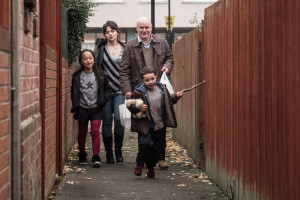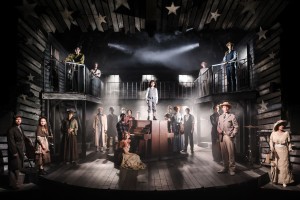I, Daniel Blake (Film)
 A middle aged man is down on his luck. He can’t work because he’s got a heart condition while at the same time he’s having trouble navigating the UK’s benefits system. He is I, Daniel Blake and it’s a film that opened this weekend.
A middle aged man is down on his luck. He can’t work because he’s got a heart condition while at the same time he’s having trouble navigating the UK’s benefits system. He is I, Daniel Blake and it’s a film that opened this weekend.
I, Daniel Blake, which won the Palme d’Or at this years Cannes Film Festival, and directed by Ken Loach, is the story of one man, in Newcastle, and the trials and tribulations, and the humiliation and despair, he goes through in an attempt to receive benefits he thinks he’s entitled to. Stand up comedian Dave Johns eloquently plays Blake, a man with so much heartbreak and despair where nothing goes his way.
We first meet Blake after he’s had a heart attack and can’t work anymore. So he applies for Employment and Support Allowance, but first he must go through a rigorous telephone assessment by a health care professional who asks him some very intrusive questions. He then heads to the Jobcente where me meets single mom Katie (Hayley Squires). She’s got two kids and has just been moved from London to Newcastle by the system because Newcastle is a cheaper place to house people on benefits. She barely has two dimes to rub together, and her and Blake form a special bond. He’s there to help her around her house, he’s their to support her in any way possible, even after she shoplifts. And he’s there at her side when she makes a wrong decision to earn money. But it’s Blake who is spiralling down a hole; he can’t apply for benefits online because he’s never used a computer. Then he’s been judged fit to work, so his benefits stop, however he doesn’t have a C.V. to look for work so he handwrites one. More despair comes his way when he is told that he’s doesn’t qualify for any benefit so he has to wait for a ‘decision maker’ to decide his fate, while Katie has to rely on the local food bank in order to feed her family. It’s one thing after another for both in this very bleak film that shows how life really must be for people on benefits.
Johns, who has very few acting credits, is superb as Blake. He beautifully portrays a man down on luck who keeps losing his optimism and will to live along the way. Squires is just as good trying to survive in a town where she doesn’t know anyone with two kids who need to eat and have new clothes for school. Loach, who is British born, harshly displays the reality of the UK’s benefits system for people who are really in need, people who lose their dignity, navigating a system that works against them and not for them. As Blake says in the film: “When you lost your self respect, you’re done for.” This film is a wake up call with a strong message that this could happen to anyone of us.
 The U.S. is in turmoil: racial discrimination is rife while immigrants arrive by the boatload to escape feast and famine in their own countries. This could describe present day U.S. but it’s actually the early 20th century in the new production of “Ragtime” now playing at The Charing Cross Theatre.
The U.S. is in turmoil: racial discrimination is rife while immigrants arrive by the boatload to escape feast and famine in their own countries. This could describe present day U.S. but it’s actually the early 20th century in the new production of “Ragtime” now playing at The Charing Cross Theatre.



